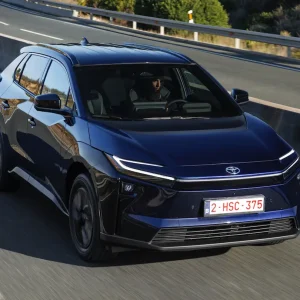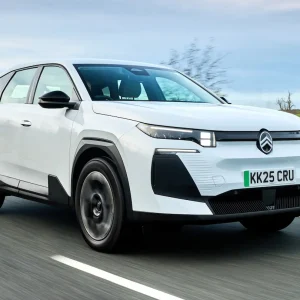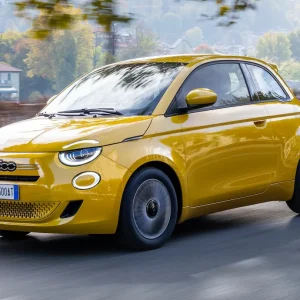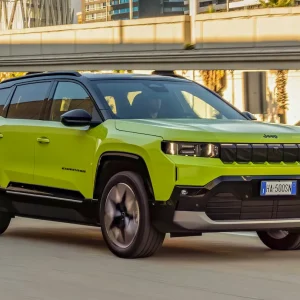One of the effects of plug-in hybrid proliferation has been to invert the way tax-conscious company car drivers look at model ranges. Until a few years ago, it was inevitably the least powerful engine choices that produced the least CO2 and, therefore, incurred the cheapest BIK payments. But now, the stellar performance of PHEVs in official emissions testing means that, often, it is in fact the most powerful, fastest car in a range that is kindest to drivers’ wallets.
One example of this is Peugeot’s 3008 SUV, facelifted late 2020, thanks to the Hybrid4 variant we’re driving here. Its pairing of a petrol engine with two electric motors – one on each axle, allowing four-wheel drive – produces a combined total of 300hp, enough to rival top level hot hatchbacks. And yet, with its CO2 emissions of just 29g/km on the official WLTP cycle and its 13.2kWh battery allowing an electric driving range of 40 miles on that test, it incurs BIK payments at just 7%. Not only is this way below petrol and diesel 3008s, but it’s also better than most other PHEVs, which commonly incur an 11% rate for a 30-39 mile electric range. The only other cars in this segment to join the Hybrid4 with over 40-mile/7% status are the Toyota Rav4 and its platform-sharing cousin the Suzuki Across, but with both of those more expensive to buy, it’s the Peugeot that narrowly works out cheapest of all for drivers (although better residual values mean the Japanese cars work out cheaper on an overall cost-per-mile basis).
So, the Hybrid4 is clearly a taxpayer’s delight, but what’s it like to drive? Well, operating in electric-only mode offers not only that impressive potential range, but also decently brisk acceleration without the engine needing to be called upon. Switching to hybrid mode lets the car make its own mind up which elements of the powertrain to deploy, but still needs a fairly heavy foot to engage the engine. Apply this, or switch to sport mode for maximum performance, and acceleration is as attention-grabbing as you’d expect from a 300hp car, if not more so thanks to the instant thrust from the electric motors.
The Hybrid4 can’t match its hot hatch performance with fun in the bends, but it corners competently enough, with the four-wheel drive system aiding traction, and the small steering wheel fitted with Peugeot’s i-Cockpit set-up (often divisive, but not bothering this reviewer here) adds a sporty feel – you just need to remember that this is still a heavy SUV when slowing it down. Another plus point is suspension that keeps body roll under control while also ably preventing ruts and potholes from jarring into the cabin, despite the aforementioned weight.
The recent 3008 range facelift featured mainly exterior styling tweaks, but there was also an infotainment upgrade, with a 10in touchscreen paired with ‘piano key’ shortcuts, making a smart and user-friendly set-up. The GT equipment grade tested here is one down from the top of the range, and features good quality interior materials, including the unusual but not unwelcome presence of alcantara on the doors and dashboard, as well as the seats. At 395 litres, boot capacity is 125 litres down on non-hybrid 3008s, but still not exactly pokey.
Aside from a general reservation about this car’s power output being overkill really for a family SUV, another potential problem is the Hybrid4’s price tag. Although it’s slightly cheaper than the rivals from Toyota and Suzuki we discussed earlier, at more than £44,000 in this spec, the Peugeot still looks expensive. Drivers could also be tempted to incur higher – but still cheap compared with ICE cars – BIK payments for similarly-priced premium PHEV alternatives such as the Volvo XC40 or Range Rover Evoque, which also offer cheaper cost-per-mile figures thanks to stronger predicted residual values. Another alternative is the lesser 225hp Hybrid option within the 3008 range, which is unsurprisingly cheaper to buy, but does also fall into the higher 11% BIK band.
Peugeot 3008 GT Hybrid4 300 e-EAT8
P11D: £44,755
Residual value: 33.6%
Depreciation: £29,716
Fuel: £1,463
Service, maintenance and repair: £2,358
Cost per mile: 55.89p
Fuel consumption: 235.4mpg
CO2 (BIK %): 29g/km (7%)
BIK 20/40% a month: £52/£104
Luggage capacity: 395 litres
Engine size/power: 1,598cc/181hp with 110hp electric motor and 113hp electric motor





